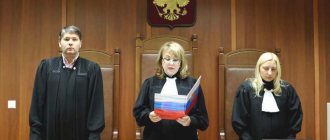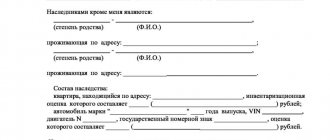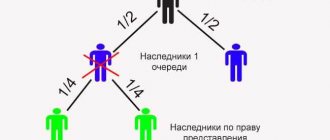Why do you need to look for heirs?
A notary is required to open a case after receiving information about the death of a citizen. This occurs when a relative of the deceased applies, presents a certificate and/or finds a will. From this moment on, the following consequences arise:
- applicants for things and objects must confirm to the notary their desire to accept them (no more than 6 months are given for this);
- if the property was bequeathed, only the heirs specified in the text of the document have the right to receive it (certain categories of subjects will be able to claim the obligatory part);
- in the absence of testamentary dispositions, distribution will occur according to law, i.e. in equal shares and according to the principle of priority.
Close and distant relatives have the right to contact a notary’s office, even if they are not included in the first line of inheritance. The property of the testator goes only to those persons who submitted an application to the notary office. Consequently, the number of recipients and the size of shares directly depends on the number of heirs who have declared their rights. If someone is late in submitting documents to a notary, the deadline can be reinstated if there are valid reasons.
Is a notary obliged to look for heirs, and why is this necessary? The notary is not directly interested in the outcome of the procedure. In the complete absence of applicants, the entire inheritance mass goes to the state or municipality. Indirect interest is caused by the payment of the state fee when issuing the certificate, since it is calculated from the value of the assets and depends on the degree of relationship of the heirs.
All nuances that may arise during the conduct of production are regulated in the Civil Code of the Russian Federation. The powers of a notary are fixed in Law No. 4462-1, which answers the question of searching for persons entitled to the property of the testator.
What data is used to search by a notary?
It is impossible to find the recipient of the property just by name. To search and alert you need:
- FULL NAME.;
- Contact details;
- place of work;
- residential address.
So, there are traditional and remote methods of searching for heirs. Regardless of who is looking for and who gets the property of the deceased, the main purpose of the search is to resolve the issue of registration of ownership. If you have a will, it is not only easier to find heirs, but also to distribute property between them.
Should a notary search for heirs?
In Art. 61 of Law No. 4462-1 talks about the interaction of a notary and citizens applying for re-registration of property rights. Here are the powers the legislation provides:
- if the notary receives a message about the death, then he is obliged to send notifications to all known applicants;
- the regulatory act gives the right to search and call relatives or other heirs by posting messages in the media and other sources;
- The law does not provide for the obligation to establish the existence of other heirs, so it is impossible to force a notary to take such actions.
To exercise his powers, the notary must obtain information and documents indicating the death of the owner. This may also be an oral appeal from persons who claim assets, but do not have the right to receive a form from the registry office. However, in practice, the fact of opening an inheritance will be documented.
The obligation to notify arises only after the death of the copyright holder if reliable information is received about the place of work, address of permanent or temporary residence of the heirs. The ability to obtain such data is limited in the following ways:
- from citizens who have applied to accept an inheritance (they can provide information about close and distant relatives, the location of applicants);
- from the contents of the testamentary form, since the testator must indicate who can count on the registration of property after his death;
- according to information received from requests for a list of assets (for example, an extract from the Unified State Register of Real Estate may contain information about persons who acquired shared ownership during the purchase or privatization of housing).
If the specified information is available, the notary is obliged to send written notices to existing addresses of residence or place of work. In practice, it is impossible to monitor the execution of such authority, and legislative acts do not contain measures of liability for violation of the procedure for sending notifications. The regulations do not contain precise criteria by which the accuracy of data on the addresses and places of work of potential heirs should be verified.
If a notice has been sent to the heirs, the following scenarios are possible:
- upon receipt of a notice from a notary, the interested party can contact the notary's office and take part in receiving the money and property assets of the deceased;
- the receipt of applications based on the results of the distribution of notices may change the procedure for acquiring rights (for example, if a child of the deceased was identified in this way, he will immediately be included in the first inheritance line);
- a citizen who has received notification of the existence of an inheritance after it has been distributed will be able to restore the period of entry through the court and present a demand for the transfer of part of the property to him or for the payment of compensation;
- Each potential heir has the right to refrain from submitting an application or submit a waiver of his share.
Information about who declared their right, which heirs are included in the text of the testamentary form, can also be obtained by other persons. Each participant in the case can familiarize himself with its materials and verify the legality of the procedure. This will allow you to go to court to recognize individual heirs as unworthy, challenge the will, promptly provide information about other applicants, and exercise other rights.
The fact of inheritance is certified by issuing a certificate by a notary. If the property was actually received by other heirs, applications after 6 months will be satisfied only if the court restores the period. It makes no sense to refer to the lack of notification from the notary or other heirs, so other evidence will have to be used in court.
What does the concept of “inheritance” mean?
An “inheritance” is considered to be property or rights that previously belonged to one person, but after his death must be transferred to the possession of his heirs. Acquired property is inherited on one of two grounds:
- according to the will drawn up by the deceased during his lifetime;
Nuances of drawing up and executing a will - legally, if the deceased did not have time to leave the document on the distribution of property.
Who has the right to inheritance by law
The testator himself has the right to transfer property to any persons, even those who are not his relatives. Heirs can be:
- legal entities and individuals;
- foreigners and Russians;
- state (if the heirs were not identified, or the deceased decided so).
Important! The will is drawn up by a notary in two copies. One remains in the custody of the notary himself, the other is issued to the testator.
In the case of a will, all property goes to the heirs listed in it according to the specified shares. In the absence of a document, the authorized bodies first search for possible heirs, and then distribute the entire property array between them according to:
- order of inheritance;
Order of succession by law - legal provisions;
- other reasons.
Although wills are drawn up during the life of the owner, it will be possible to find out the final conditions and the array of transferred property only after his death. Witnesses are present when the document is prepared, but they must not disclose the contents of the document until after death.
Ways to find likely candidates
How does a notary search for heirs if there is no address information or information about the place of employment? Since the law does not oblige to search for heirs by will or law, the following actions are permitted:
- publication of a notice of invitation to specific heirs in the case through the media (newspapers, magazines, other periodicals, television, radio, etc.);
- placing a public announcement upon the opening of an inheritance, when there is no will and none of the heirs has contacted a notary;
- publishing advertisements on websites and social networks;
- requests to official registers and databases (for example, a request to the migration service of the Ministry of Internal Affairs, the State Traffic Safety Inspectorate, Rosreestr, etc.).
Unlike FSSP employees, when conducting enforcement proceedings, a notary is not entitled to use the services of search specialists. This is due to the fact that the costs of search activities cannot be forcibly imposed by the notary on the heirs or withheld from financial and property assets. However, the heirs themselves have the right to hire individuals or companies to collect information about the composition of the belongings and objects of the deceased and other participants in the case.
The regulations do not provide instructions on how to search for persons claiming inheritance. When conducting such events, the requirements for respecting privacy, correspondence, and personal data must be met.
The ruble is not forgotten
As the Federal Notary Chamber emphasizes, the service is universal and can be used to work with various credit organizations. Moreover, it allows you to find out whether a person who has left this world has impersonal metal accounts, DEPO accounts, safe deposit boxes and other products of a credit institution. “That is, the risks that some part of the inherited property will remain undetected will now be significantly less,” the FNP emphasizes.
It doesn't matter whether a person left a will or not. Everything he left behind must be divided. If a person has recorded his last will, that’s good. If not, the property will be divided according to law. But often the main problem is finding this property.
RG experts examine the intricacies of notary work in the “Legal Consultation” section
The person did not warn his relatives that he had hidden money in a safe deposit box at such and such a bank, opened a metal account in silver or palladium, etc. There isn't even a list of his regular accounts. What should I do? The notary has to look for all this. Now the search will be much easier.
“New digital notary services make general digitalization processes not only convenient, but also secure,” said Konstantin Korsik, President of the Federal Notary Chamber. “They guarantee the preservation of notarial secrecy, the protection of citizens’ rights, while providing people with new opportunities, saving their time and money. And in this regard, successful cooperation between the notary and banks, as we see in this example, is a very important factor for the stability of civil turnover.”
A response from the bank can be received within a few hours after the notary's request. Thus, the notary will be able to obtain the most accurate and complete information about the composition of the inheritance estate within the six months allotted for this by law, and the process of preparing documents for the heirs will not drag on for months or years.
“In the future, it is expected that as many credit institutions as possible will be connected to the service,” the Federal Notary Chamber emphasizes. — The electronic option for interaction between notaries and banks has established itself as the most efficient and effective way to obtain reliable and up-to-date information about the accounts and deposits of testators. The alternative option of sending a request - by mail - does not guarantee timely receipt of the letter by the addressee, and sometimes even leads to the loss of letters, as a result of which the process of establishing the inheritance is delayed indefinitely.”
Paper document flow turns out to be even more ineffective when even an approximate list of banks where the testator’s funds could be stored is unknown. “Today, there are over four hundred credit institutions operating in the country, and sending letters to each of them is a large amount of work that takes a lot of time and requires, among other things, significant financial costs,” say the notary.
Another important detail: notaries will also be able to obtain information about the debts of the deceased. After all, debts are also inherited. If a deceased person has several loans, the heirs should find out about it in a timely manner. There are also some nuances here. As lawyers explained to RG, the heir is responsible for the loans within the limits of the inheritance received. That is, strictly speaking, you cannot take more from him than he received. However, in practice, heirs may overpay. Not everyone understands the legal intricacies and cannot always defend their rights. So if the deceased has 200 thousand rubles in his account, and he has to pay a million on the loan, it may be better not to enter into an inheritance, then the debts will not be transferred to the heir.
By the way, a new super service will appear on the State Services portal: “Loss of a loved one.” In a tragic situation, a citizen will be able to make an appointment with a notary through the portal and, in general, quickly resolve issues related to registration of inheritance.
What does the property search law say?
Since 2021, notaries have been given the authority to send requests about the composition of the property remaining after the death of the owner. However, the specialist is obliged to do this only at the place of production, i.e. place of residence of the copyright holder at the time of death. Sending requests to authorities outside this territory is a right, not an obligation, of notary employees.
To identify assets, you are allowed to take the following actions:
- you can request information about real estate from Rosreestr (according to Law No. 217-FZ, an extract from the Unified State Register of Real Estate can be obtained not only by a notary, but also by any interested entity);
- official data on the deceased’s vehicle can be obtained from the traffic police;
- information about the availability of accounts and deposits is requested from the bank;
- title documents can be presented by the participants in the proceedings themselves (for example, if, while putting the apartment in order after death, a relative found papers for the movable things and real estate of the deceased).
A search in public registers is possible by the address and surname of the deceased owner, passport details. Participants in proceedings have the authority to request information from the registers themselves, if so provided by law. An independent search for an inheritance can also occur by submitting advertisements and messages, interviewing relatives, friends and colleagues.
Not only financial and property assets identified at the time of issuance of certificates are subject to distribution. The law allows the issuance of a certificate indicating the share of all things and objects remaining after the death of the copyright holder. In this case, re-registration of rights or actual receipt will be possible as they are identified and after 6 months from the date of death.
How to find out if there is a will?
It is almost impossible to find out whether the testator has a will. The whole point is that all the persons who were present when the will was drawn up cannot disclose the fact of its existence, much less its contents. Before the opening of the inheritance, no successor can find out who inherited the property.
Only after the death of the testator can you look for the papers. However, in most cases, heirs simply do not know where to go in order to find the property of the deceased. The papers can be found in the testator's apartment, at the notary's office, where his last registration was, or when sending a request to the notary chamber.
If there is no notary in the locality
A similar situation is possible. You can send papers by mail only when registering. The expression of will itself is not drawn up without personal participation. But if you are an heir and want to submit an application on time, use the postal service to accept the inheritance. However, in this case, the application must be endorsed by a notary. Similar actions are resorted to if you need to contact a notary who is located in another city.
A proxy is also used. It will be better if it is a professional lawyer. On the basis of a power of attorney, he will be able to represent interests not only before a notary, but also in court, if registration is expected in court. The service is paid, but completely excludes the personal participation of the principal, which is convenient when there is not enough time. And if urgent action is needed, the lawyer will do everything himself.
Search for applicants for inheritance by a notary
It is now clear that the heirs themselves should contribute to the search for undeclared heirs. But the search for heirs by a notary is his good will. He does not receive money for this activity and does not have to search for all applicants for the declared inheritance. However, his duties include notifying the heirs who are identified in connection with this case about the opened inheritance case.
To do this, he must use the data:
- about their last name, first name and patronymic;
- about their place of registration and residence;
- about their place of business, telephone number;
- from people familiar and knowledgeable about these citizens.
He can obtain any information about the wanted heirs either independently or with the help of the heirs who have appeared. If no heir, despite the notification, shows up, the entire inheritance of the deceased citizen will go to the disposal of the state.
Deposit search
Initiating the procedure for receiving an inheritance for the bank deposits of a deceased relative is possible if the heirs do not have banking agreements that confirm the fact of opening the deposit.
But it is not uncommon for people to turn to a notary who have absolutely no idea which bank they should contact.
For tracing deposits, a notary is truly an excellent assistant. He will prepare the necessary documents and send notary requests to financial institutions, if the client has no desire to do this on his own.
Register of Wills
In Russia there is a register of wills, which makes the work of notaries more transparent and reduces the number of frauds and deceptions when inheriting property. This information system contains information about wills. The electronic service is a place where information from all notaries flows. Thus, all data on wills is stored in one system. Searching for documents and carrying out the procedure for obtaining an inheritance becomes easier.
Thanks to this service, information is quickly processed and changes are made to documents. Anyone can find a will drawn up by a relative. This is an excellent solution if the original document is lost.
After the database in question appeared in the Russian Federation, crimes related to inheritance of property began to occur much less frequently.
Unauthorized persons cannot access this site. Those employees who process incoming data sign a non-disclosure agreement.
When a request is received from relatives, representatives of the notary chamber provide information about where and when the meeting was held. This way, the heirs have the opportunity to contact a notary’s office and begin to draw up documents.
All information can be obtained only after the death of the testator.
Who must notify about the existence of an inheritance?
The law does not provide for special bodies to search for heirs or search for inheritance; only the duty of notifying them is assigned to an employee of a notary’s office if he knows their whereabouts.
The notary's obligation to inform applicants about the death of their relative arises only if there is a completed will.
Searches take place by name and address, through other legal successors or by transferring the information received to the newspaper. It is also possible to place a wanted notice on other official notary websites.
The specialist's obligations are considered extinguished immediately after notification is sent to successors by letter of notification. It is impossible to force him to find anyone else.
If the testator did not leave a last will, then there are no grounds for opening a search and there is nothing that obliges the notary to search.







